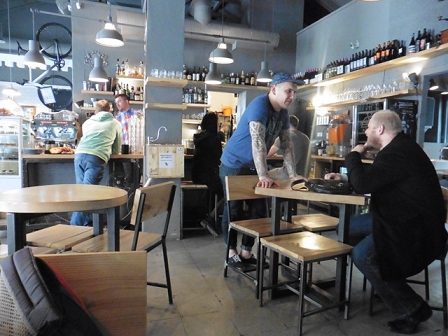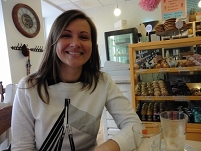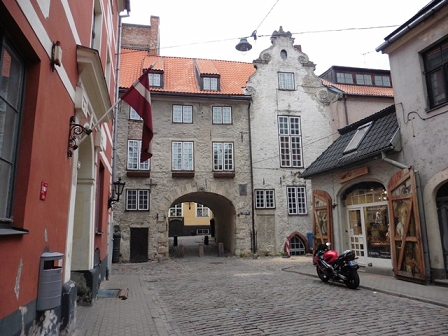Erstellt am: 23. 6. 2015 - 09:52 Uhr
Weathering Austerity
"The economic crisis affected Latvian culture in the most positive way", says Latvian café owner Ingemars Dzenis. "Before the big bubble burst everyone thought they could buy whatever they wanted for whatever money. Since then we have begun to think more about what we really need."

Chris Cummins
That seems an incredible statement. Latvia was one of the countries hardest hit by the financial crisis that developed after the crash of 2008. The small Baltic country saw its economy shrink by a quarter over two years.
Indeed, according to World Bank figures, its 2009 recession was the worst slump recorded anywhere in the world. GDP collapsed by 18 percent in just one year. Unemployment reached almost 23 percent, the highest in Europe. Hospital budgets were cut by 40 percent . Operations had to be postponed or even cancelled.

Chris Cummins
"It was so crazy. It happened so fast. At first we couldn’t understand what was happening", remembers journalist Eva Ikstene Strapcane. "People weren’t getting their salaries paid. The politicians took pay cuts of 30 percent. It was all very sudden."
The New Front Line?
The Baltic State Latvia celebrates 25 years since it re-declared independence
But now the economy is growing again, at about 4 percent a year. That makes it one of the most dynamic economies in Europe and new businesses are popping up all over the capital Riga. That's why Ingemars Dzenis, who opened his hip burger and coffee bar called Vest this winter, feels that the painful economic episode, that Latvia is slowly emerging from, was probably an important learning curve.
"The effects were at first really devastating and there was at first a lot of suffering to come out of it," says Krisjanis Ozois of the Latvian Institute, "but in a way we can look at it as a really good time to reshape who we are and what we need." During the crisis, he says, necessary reforms in society and in the ways Latvians do business. "We weren't competitive and we were wasting Money... We realized it was about creating quality products." He says that now, armed with a better understanding of their potential goals, Latvian entrepreneurs are once again prospering and are better equipped for the future.
Another fresh new business is the artisanal shoe shop owned by Elina Dobele. She was working as an architect at the time of the great crash. But when the economy nosedived new building projects were cancelled and her work dried up.
Northern Riding
Riga in Latvia would like to become a cycling hub to rival Copenhagen
It was a sink or swim moment and Elina swam, turning a hobby into her new career. Now she designs and sells shoes in the centre of the capital Riga, a small business set up with 3,000 euros of savings added to entrepreneurial grants from the Latvian government and the EU. She says that, for her, the crisis proved in some ways a liberation.
"We had a lot of work when I was working as an architect. We were working so hard. I didn’t have time to stop and consider, whether the job I was doing was good for me or whether I liked it. I was just working. When the work dried up I had time to think about what I really want to achieve with my life."
It wasn't architecture.
Shoe design had long been Elina’s passion - now they are her working life, daily bread and source of independence. The shoes she designs are produced in the basement of her small shop and she even welcomes and advises customers herself:
Betrayal At The Corner House
25 years after the end of communism, the former KGB building in Riga, Latvia, still haunts and divides a nation
"I understood, that I wanted to take more responsibility for what I did with my life and what I wanted to say with my work."
"He inspired the people"
Elina gives a lot of credit to Prime Minister Valdis Dombrovskis, who took over in 2009 at the height of the crisis. The measures he introduced were incredibly tough - some teachers even saw their wages fall by 70 percent - but Dobele says Dombrovskis provided strong leadership: "He inspired the people. He told us, it was going to be tough. He said, we had to concentrate on finding new solutions."
Dobele’s shoe business is part of a wave of new artisanal small businesses that have been flourishing in Latvia, a development that has seen Riga dubbed "the new hipster capital of Europe". But are there any lessons that can be learned outside of Latvia?
Well maybe. Elina says it was important for small countries to turn away from mass-production since Europe cannot compete with the low wage competition of China and South-East Asia. But, she insists, if they focus on high-quality, locally produced goods, Latvian businesses will find a market.
"If you have a good idea and you produce your goods well, you will find customers. People are sick of buying so many cheap, mass-produced T-shirts. They want something that has a certain quality."
"Spending less, thinking more"
Journalist Eva Ikstene Strapcane also thinks that there have been positive side-effects of the shock of austerity. Post-communism, she says, there was almost an orgy of materialism - everyone wanted a bigger car and a bigger flat and more stuff.
A Front Line For Gay Rights
The Europride 2015 in Riga, Latvia.
"Now we are spending less and we are thinking more about what we do spend. We are investing more in the local Latvian produce and in the Scandinavian market and they buy our stuff too."

Chris Cummins
"We Just Have Our Brains"
She also says that the crash has drummed into young Latvians the need to export and create sustainable business models that won’t disappear with the next burst bubble. "We learned that there is no such thing as easy money." She says, not just in Riga but in towns across Latvia you now find talented young Latvians working out of garages thinking of products that the rest of the world needs.
"We realised, that we have to use our skills. We don’t have oil, we just have woods and we have our brains. So we have to use them!”
Eva also says that the privations of wage cuts fed into a new trend of creative recycling - finding new ways to reinvigorate new materials. Cottage industries have grown out of making new dresses and shirts out of what would have once been considered rags. "I think we have lost our obsession with consuming and, in a way, become greener."
Compelled To Leave
But if the crisis has had positive side effects, it would be wrong to brush over the pain. Latvia's government sacked 30 percent of public sector staff and slashed salaries by 40 percent. Not everyone can become a creative entrepreneur: many felt they there was no longer a place for them in the Latvian economy. It has been noted that only one major anti-austerity protest was held in Latvia, in stark contrast to Greece or Spain; but that is only half the story.
"The form of our protest was leaving the county", says Eva. Tens of thousands of Latvians have left their homeland to seek better life abroad and their absence is keenly felt in a population that has dipped to below two million. "So many people left." The cuts associated with austerity increased an exodus that had already begun in earnest with EU accession in 2004. Between 2000 and 2011, the population fell by about 13 percent.
Desolate Countryside
It’s a phenomenon that worries Ingemars: "If people leave to get an education abroad or learn some skills abroad that is great. Education always expands your horizons. But if they are just leaving to have a bit more money, I think that is not so great. If we don’t stay, maybe even suffer a bit, then we will never have people to build our country together."
Even as Riga is being celebrated as a vibrant "hipster capital", parts of the countryside are desolate. "The villages sometimes look so empty", says Eva Ikstene Strapcane. "You just see the very old and the very young. I think that is the biggest threat to our country post-crisis."
"You Have To Be Patient"
Eva refused to be drawn on any comparisons with Greece, pointing out that Latvia is much smaller and with a different history and culture. And economists have pointed out that much of the recovery has been based on exports to neighbouring Scandanavia. It's easier to prosper when you neighbours are wealthy.
But nonetheless I ask Eva for her biggest lesson from the painful recession that Latvia has resiliently survived:
"I think you have to be patient. We have been patient for years. We knew, it would be bad, but we knew, it would get better. We've survived a lot. We knew we would get through."


